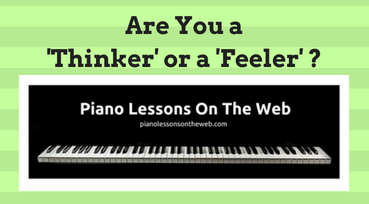|
The answer to this question can make a huge difference in how fast and how well you learn to play all of the music that you want to on the piano. If you answer this question by saying, "well, let me think about this for a minute," then you probably have one answer - you're a thinker. Conversely, if you respond quickly and with emphasis that, "of course, I feel it first", then you are most likely a feeler. Both ways of responding to this question tells us how we process information. We either receive and process it through our intellect first, or we receive and process it through our feelings first. We can also call these cerebral and/or intuitive learning methods. Intuitive learners are more right brained learners meaning that we are more abstract, big picture kind of thinkers. We respond to images, emotions, inner hunches, more than cerebral processors who focus more on details, systematic approaches, and give less attention to emotional feeling. A good example in our piano playing is noticing how we respond to and process rhythm. Here's an important question to ask yourself: Do you learn rhythm easier by verbally counting all of the beats out in your piano music, or do you learn it easier by hearing it and feeling it without knowing intellectually what you are playing rhythmically? Before we go on, know that either way is fine...this isn't about one way being wrong and the other being right.
There is a high correlation between feelers and listening first as well as with thinkers and reading first. Some folks can go through a few measures visually and not really understand what they are "reading" because they can't hear it first. Others simply have to read through it visually before they can even begin to play and feel it. Once you figure out how you approach your piano playing and most other learning, you need to work on the processing method that you are the weakest in as well.
The more that you work on both of these ways of learning, you will get faster and stronger in how well you process anything new you take on in your piano playing. Actually, this will help you in all areas of life; especially when taking on new work challenges or schoolwork, community service, and even your own personal growth. Identify the process that you naturally use to learn and apply that when you are starting anything new on the piano. Make sure however, that you also challenge yourself and create faster growth by making yourself learn something small each day that is not your easiest way to learn. It's a bit like working out your weaker side to make it just as toned as your stronger side. When you've mastered this in your piano playing, you'll be surprised to see how it works in all areas of your life. Piano playing teaches us a lot about life, doesn't it? Stay Tuned to pianolessonsontheweb.com to learn much more and achieve your dream of playing the piano! Leave a Reply. |
AuthorMost blogs written by Archives
June 2020
Categories
All
|


 RSS Feed
RSS Feed